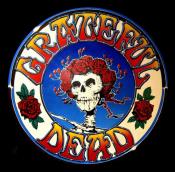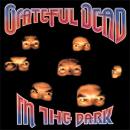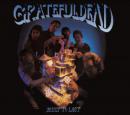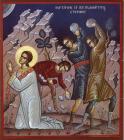Saint Stephen with a rose,
In and out of the garden he goes
Country garden in the wind and the rain,
Wherever he goes the people all complain
Stephen prospered in his time,
Well he may and he may decline.
Did it matter, does it now?
Stephen would answer if he only knew how
Wishing well with a golden bell,
Bucket hanging clear to hell,
Hell halfway twixt now and then,
Stephen fill it up and lower down and lower down again
Lady finger, dipped in moonlight, writing what for?
Across the morning sky.
Sunlight splatters, dawn with answer,
Darkness shrugs and bids the day good-bye.
Speeding arrow, sharp and narrow,
What a lot of fleeting matters you have spurned.
Several seasons with their treasons,
Wrap the babe in scarlet colors, call it your own.
Did he doubt or did he try?
Answers aplenty in the bye and bye,
Talk about your plenty, talk about your ills,
One man gathers what another man spills.
Saint Stephen will remain,
All he's lost he shall regain,
Seashore washed by the suds and foam,
Been here so long, hes got to calling it home.
Fortune comes a crawlin, calliope woman,
Spinnin that curious sense of your own.
Can you answer? Yes I can
But what would be the answer to the answer man?
In and out of the garden he goes
Country garden in the wind and the rain,
Wherever he goes the people all complain
Stephen prospered in his time,
Well he may and he may decline.
Did it matter, does it now?
Stephen would answer if he only knew how
Wishing well with a golden bell,
Bucket hanging clear to hell,
Hell halfway twixt now and then,
Stephen fill it up and lower down and lower down again
Lady finger, dipped in moonlight, writing what for?
Across the morning sky.
Sunlight splatters, dawn with answer,
Darkness shrugs and bids the day good-bye.
Speeding arrow, sharp and narrow,
What a lot of fleeting matters you have spurned.
Several seasons with their treasons,
Wrap the babe in scarlet colors, call it your own.
Did he doubt or did he try?
Answers aplenty in the bye and bye,
Talk about your plenty, talk about your ills,
One man gathers what another man spills.
Saint Stephen will remain,
All he's lost he shall regain,
Seashore washed by the suds and foam,
Been here so long, hes got to calling it home.
Fortune comes a crawlin, calliope woman,
Spinnin that curious sense of your own.
Can you answer? Yes I can
But what would be the answer to the answer man?
inviata da Riccardo Venturi - 26/12/2020 - 12:13
Lingua: Italiano
Traduzione italiana / Italian translation / Traduction italienne / Italiankielinen käännös:
Riccardo Venturi, 26-12-2020 12.39
Riccardo Venturi, 26-12-2020 12.39
Santo Stefano
Santo Stefano con una rosa,
Nell'orto entra, dall'orto esce
Pioggia e vento sull'orto in campagna,
Ovunque lui vada, la gente si lagna
Stefano visse bene a suo tempo,
Certo, può, sì che può declinare.
Importava allora, importa ora?
Stefano risponderebbe se solo sapesse come
Facendo gli auguri con un campanello d'oro
Secchio appeso dritto all'inferno,
Inferno a mezzastrada tra ora e allora,
Stefano, colmalo e tiralo giù, e ritiralo giù
Dito di donna intinto nel chiardiluna, scrive per cosa?
Attraversa il cielo al mattino.
Schizza la luce del sole, l'alba con una risposta,
Il buio fa spallucce e saluta, partendo, il giorno.
Freccia veloce, aguzza e stretta,
Quante cose fugaci hai respinto,
Tante stagioni coi loro tradimenti,
Avvolgi il bimbo di scarlatto, chiamalo tuo.
Aveva dubbi oppure ci provava?
Una caterva di risposte nel tempo che passa,
Parla della tua abbondanza, parla dei tuoi mali,
Uno raccoglie ciò che altri dissipa.
Santo Stefano resterà,
Ciò che ha perso, lo riavrà.
La spuma batte sulla spiaggia,
E' stato tanto qui, lo dovrà chiamare a casa.
La sorte arriva strisciando, come una bella donna,
E ti rigira quel curioso senso tuo.
Sai rispondere? Sì, so rispondere.
Ma che risposta si darebbe all'Uomo delle Risposte?
Santo Stefano con una rosa,
Nell'orto entra, dall'orto esce
Pioggia e vento sull'orto in campagna,
Ovunque lui vada, la gente si lagna
Stefano visse bene a suo tempo,
Certo, può, sì che può declinare.
Importava allora, importa ora?
Stefano risponderebbe se solo sapesse come
Facendo gli auguri con un campanello d'oro
Secchio appeso dritto all'inferno,
Inferno a mezzastrada tra ora e allora,
Stefano, colmalo e tiralo giù, e ritiralo giù
Dito di donna intinto nel chiardiluna, scrive per cosa?
Attraversa il cielo al mattino.
Schizza la luce del sole, l'alba con una risposta,
Il buio fa spallucce e saluta, partendo, il giorno.
Freccia veloce, aguzza e stretta,
Quante cose fugaci hai respinto,
Tante stagioni coi loro tradimenti,
Avvolgi il bimbo di scarlatto, chiamalo tuo.
Aveva dubbi oppure ci provava?
Una caterva di risposte nel tempo che passa,
Parla della tua abbondanza, parla dei tuoi mali,
Uno raccoglie ciò che altri dissipa.
Santo Stefano resterà,
Ciò che ha perso, lo riavrà.
La spuma batte sulla spiaggia,
E' stato tanto qui, lo dovrà chiamare a casa.
La sorte arriva strisciando, come una bella donna,
E ti rigira quel curioso senso tuo.
Sai rispondere? Sì, so rispondere.
Ma che risposta si darebbe all'Uomo delle Risposte?
Bella, non la conoscevo. Manca il primo verso: "Saint Stephen with a rose, in and out of the garden he goes"
Lorenzo - 26/12/2020 - 13:23
×
![]()








Jerry Garcia - Phil Lesh - Robert Hunter
Released: June 1969
Album / Albumi: Aoxomoxoa [1970]
Ora che il famoso “Natale diverso” è passato, come tutti gli anni, è arrivato -sempre come tutti gli anni- il giorno dopo. Che sia un giorno dopo, almeno qui dove mi trovo attualmente, lo si vede anche dal fatto che ieri è stata una giornata da lupi: pioggia fitta incessante, buio a mezzogiorno e, in serata, pure la neve. Davvero un Natale da “Day after”; solo che, il day after, quello vero -cioè oggi- splende un magnifico sole. E, sotto questo magnifico sole, mi ha colto una questione fondamentale: ma in mezzo a tutte queste canzoni natalizie, giojosi canti, perfide canzoni antinatalizie, Gesù Bambini, presepi, famiglie che si cazzottano a Natale, fattoni pisani a Natale, villancicos catalani e filastrocche con gli asinelli, una canzone sul povero Santo Stefano, il protomàrtire del giorno dopo, ci sarà? Cioè, già gli tocca venire in coda al Principale, fu il primo a cui toccò una pessima sorte in nome della Fede, il 26 dicembre se ne stanno tutti a dormire mangiandosi gli avanzi del giorno prima, prosegue la zona rossa e quant'altro, e manco una canzoncina? Sempre che ci sia?
C'è, c'è. Eccome che c'è. Con essa, i Grateful Dead aprirono addirittura la loro esibizione a Woodstock. E, secondo la loro stessa ammissione, si riferisce proprio a Santo Stefano protomàrtire, addirittura con degli accenni alla sua tortura; scritta nel giugno del 1969 e inserita, nel 1970, nell'album Aoxomoxoa, un palindromo privo di senso. C'è chi ritenne questa canzone dedicata a Stephen Gaskin (si veda sotto), ma, come già detto, furono i Grateful Dead stessi a smentire tale fatto.
Naturalmente, e come è lecito attendersi, ci si potrebbe ragionevolmente chiedere che cosa, e quanta di quella cosa (o di quelle cose), si fossero fumati gli autori della canzone e, in particolare, del testo. Resta il fatto che l'interpretazione più comune ed accettata è che tale testo si riferisca proprio agli ultimi giorni di vita ed al martirio di un povero disgraziato di chiamato Stefano (il cui nome, ironia della sorte quest'anno particolare, significa, in greco, “Corona”), avvenuto con tutta probabilità presso la Porta Orientale di Gerusalemme. Come tutti sanno, tale martirio avvenne a pietrate addosso; Stefano fu, insomma, lapidato.
In Gran Bretagna (e, in generali, in tutti i paesi del Commonwealth), il giorno di Santo Stefano si chiama, come tutti sanno, Boxing Day. Tale curioso nome deriva proprio dalle scatole (“Giorno dell'Inscatolamento”, si potrebbe dire) dove si mettevano i doni riservati ai dipendenti delle ditte e alle classi sociali più povere. In particolare, nel XIX secolo era nata l'usanza che le famiglie agiate britanniche preparassero anche apposite scatole con dentro, oltre ai doni, anche gli avanzi del ricco pranzo natalizio da destinare ai servi, che il 26 dicembre avevano giorno libero e potevano portare alle famiglie gli avanzi dei padroni. Il Boxing Day è famoso per due altre cose: tradizionalmente rappresentava l'inizio dei saldi (prima dell'avvento del “Black Friday”, che a me continua a ricordare il crollo di Wall Street del 1929, ma fa niente), e tuttora vi si giocano partite dei campionati di pallone e di altri sport a prescindere dal giorno della settimana in cui cada. Santo Stefano si è fatto martirizzare anche per questo. Nel giorno di Santo Stefano, in ultimo, è avvenuta la più grande tragedia naturale del XXI secolo: lo tsunami asiatico del 26 dicembre 2004, che ha provocato circa 250.000 vittime, e che ha fatto strage anche di turisti occidentali.
A dire il vero, di canzoni su Santo Stefano ne conosco un'altra; e non è escluso (sì, è una minaccia) che non ci infili pure quella, qua dentro. E' la Child Ballad n° 22 e si chiama St. Stephen and Herod; cosa ci facesse Santo Stefano con Erode non è dato saperlo, ma non bisogna stupirsi di lievi anacronismi in quelle antichissime canzoni. Intanto si rimedia qui con questa pagina finalmente tutta per Santo Stefano, quello condannato per l'eternità a venire il giorno dopo. Ma se il Natale fosse il ventiquattro...? [RV]
From Songfacts
Whoever and whatever "St. Stephen" is actually about is somewhat more cryptic than it may appear. Generally, two different men have been batted around as likely subjects of the song.
For a long time, many fans believed the song was about Stephen Gaskin, a prominent counterculture and spiritual figure in the Haigh Ashbury during the 1960s when the Dead lived there. In 1971 Gaskin left the West Coast to start a commune near Summertown, Tennessee. The commune was named "The Farm" and was one of the most prominent communities of its kind. As of 2018, it still exists (though in a different form than the one in which it was founded). Knowing Gaskin's "saintly" attributes and the Dead's proximity to him, it's easy to see how products of that time and space made this connection, but this interpretation was always more on the fringe than the other one.
The vast majority of listeners over the years believe "St. Stephen" to be about the first martyr of Christianity, a 1st century deacon who preached a version of Christ's teachings that angered many other religious leaders of his time ("wherever he goes the people all complain").
The real Stephen was stoned to death after being tried by authorities. Paul the Apostle, one of the most important figures in the New Testament, witnessed Stephen's martyrdom. Acts 6:8–10 reads: "Now Stephen, a man full of God's grace and power, performed great wonders and signs among the people. Opposition arose, however, from members of the Synagogue of the Freedmen (as it was called)—Jews of Cyrene and Alexandria as well as the provinces of Cilicia and Asia—who began to argue with Stephen. But they could not stand up against the wisdom the Spirit gave him as he spoke."
So, the Biblical Stephen seems like a slam dunk as the Dead's "St. Stephen," but Robert Hunter, who wrote the lyrics to the song, muddied the waters in various interviews. When Relix asked if the song was about "anyone specific," Hunter responded, "No, it was just Saint Stephen."
Also, while talking to author/historian Jeff Tamarkin, Hunter said, "I had been working on this a long time before I gave it to the Grateful Dead, before I took off for New Mexico, which is where I originally sent them the lyrics from. I don't know what to say about this song, except that it was very important to me. It seemed to be saying oodles. It's still one of my favorite. I didn't know who the real Saint Stephen was until I wrote it."
Still, despite Hunter's somewhat elusive comments, the song's lyrical content is so similar to the story of the martyred Stephen that it's hard to believe that the song's about anyone else, though perhaps Hunter took some poetic license with the story and was talking about things more archetypal or abstract than a literal historical biography.
One line from the song goes, "What would be the answer to the answer man?" This is possibly a roundabout reference to a radio program titled The Answer Man, which was sort of an early version of an internet browser. It allowed listeners to mail in questions on any topic. Some questions were answered on air while others were answered through the mail.
The show ran from 1937 to 1956 and was sponsored by Trommer's White Label Beer. The "Answer Man" himself was Albert Carlyle Mitchell, but he had a whole staff of people and established contacts with experts in nearly every conceivable field helping get the proper answers to the questions.
Jerry Garcia wrote most of the music for the song, while Phil Lesh came up with the coda. The Deadlists Project has the song's first performance as being on May 24, 1968, at the National Guard Armory in St. Louis, Missouri. According to Dead.net, there were 289 known live performances of the song.
Richard Beckley wrote a song hymn titled "Saint Stephen Was an Holy Man" in 1833. The seventh verse is reminiscent of the "St. Stephen" line, "Wherever he goes the people all complain." That verse goes:
Their hearts in sunder clave
And gnashing on them with their teeth
Like mad men they did rave
The Dead opened their 1969 Woodstock performance with "St. Stephen." The band's set ran from late Saturday night (August 16) into Sunday morning (August 17). Dead frontman Jerry Garcia later said he was disappointed and frustrated with their set. Too many drugs, drinks, rain, mud, and equipment malfunctions (including instruments that delivered small electric shocks to the band as they played) all created a frustrating and disappointing performance. With "St. Stephen," however, the band seemed to come out the gate pretty strong, and now that it's widely available, many fans hold the performance in higher esteem than Garcia did.